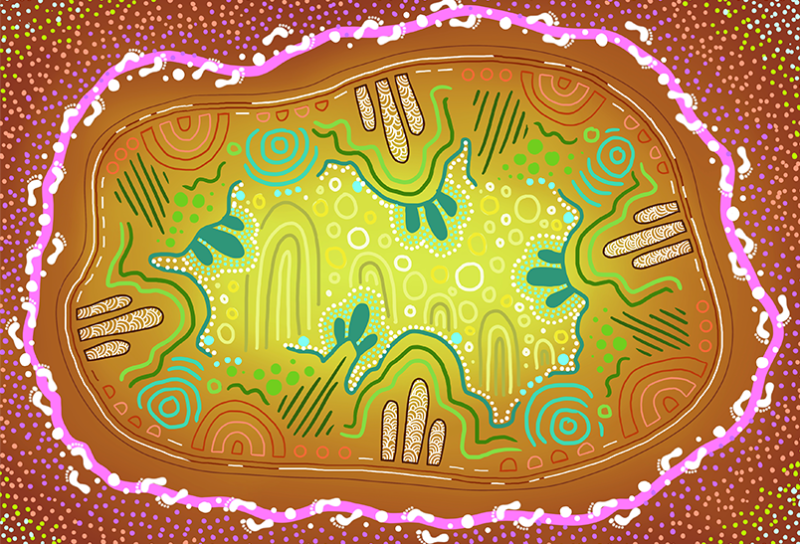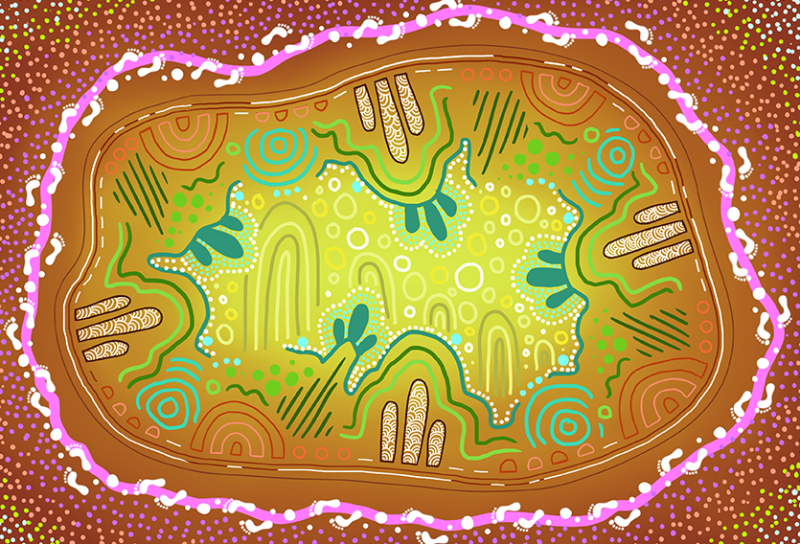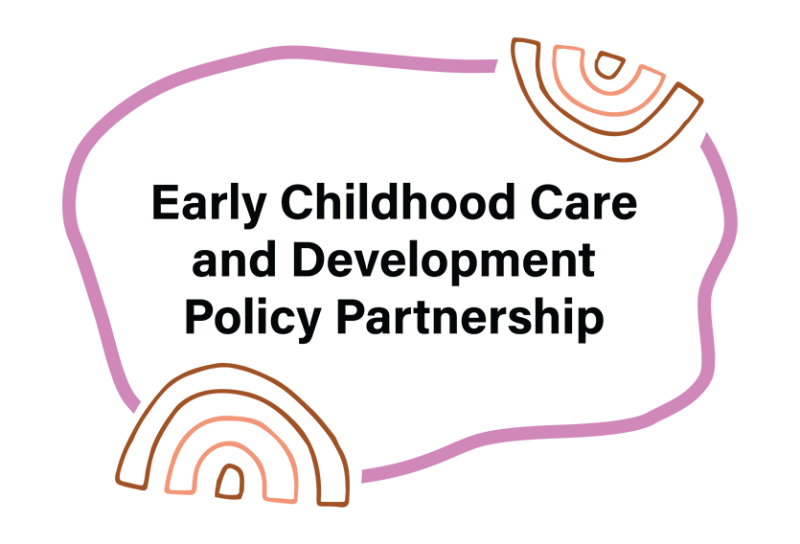What is the Early Childhood Care & Development Policy Partnership?
The Early Childhood Care and Development Policy Partnership is a way for Aboriginal and Torres Strait Islander communities to work with governments to make real change for children and families. It brings community leaders and governments together to listen, share and make decisions that support strong early childhood outcomes.
The Early Childhood Care and Development Policy Partnership (Partnership, ECCDPP) brings together Aboriginal and Torres Strait Islander leaders—including Peaks and independent experts—and government representatives to provide advice and make shared decisions about matters affecting Aboriginal and Torres Strait Islander children and families. Through regular meetings, Aboriginal and Torres Strait Islander leaders and government representatives work together to drive reforms and improve early childhood outcomes. This partnership is a step towards greater self-determination, ensuring that policies reflect the strengths and needs of communities.
The Partnership is co-chaired by SNAICC – National Voice for our Children and the Australian Government Department of Education.
The Early Childhood Care and Development Policy Partnership aims to:
- identify reforms to support Aboriginal and Torres Strait Islander children to achieve their potential in the early years and to set them up for long-term success
- drive action to implement the priority reforms in the National Agreement on Closing the Gap
- identify opportunities to work more effectively across governments, Coalition of Peaks and community organisations
- enable Aboriginal and Torres Strait Islander representatives, communities and organisations to negotiate and implement agreements with governments to support Closing the Gap.
The Partnership presents an opportunity that has not existed before for Aboriginal and Torres Strait Islander peoples to work collaboratively in genuine partnership with governments to drive community-led early childhood outcomes. It provides an opportunity for Aboriginal and Torres Strait Islander leaders to ask questions of government and provide advice to improve decision-making. Collectively, the Partnership influences and informs government policy relating to early years so that Aboriginal and Torres Strait Islander children ages 0-5 can thrive.
As a new partnership under Closing the Gap, the Early Childhood Care and Development Policy Partnership has given more power to Aboriginal and Torres Strait Islander communities to effect real change.
Our role and impact
SNAICC has a key role in the Early Childhood Care and Development Policy Partnership as Co-Chair.
The Partnership develops policy and funding reforms that enable Aboriginal and Torres Strait Islander children to thrive in their early years and remain connected to culture, kin and community. These reforms build on the inherent strengths and capabilities of the Aboriginal and Torres Strait Islander community-controlled sector, which delivers quality, culturally safe services to children and their families across Australia. The Partnership progresses policy reform that improves outcomes for Aboriginal and Torres Strait Islander children and families and is accountable to community and Joint Council on Closing the Gap—which is a body made up of Aboriginal and Torres Strait Islander peak bodies and government Ministers.
Impact of the Partnership
In its first two years the Partnership has already made a lasting impact.
The Partnership has supported the establishment of the National Commissioner for Aboriginal and Torres Strait Islander Children and Young People, building off years of advocacy from community leaders. The National Commissioner—which commenced operations on 13 January 2025—will be a voice for our children and help keep Government accountable.
Aboriginal and Torres Strait Islander community leaders are using the Partnership to work with governments to make improvements in early childhood education and care funding and access. The work of the Partnership contributed to the Commonwealth Government’s recent changes to provide 100 hours of subsidised early childhood education and care for Aboriginal and Torres Strait Islander children each fortnight and removing the Activity Test—which had created a significant barrier for Aboriginal and Torres Strait Islander families in accessing care.
To date, the Partnership has also contributed to the National Vision for Early Childhood Education and Care, the Productivity Commission Closing the Gap Report and the Productivity Commission Inquiry into Early Childhood Education and Care.
The Early Childhood Care and Development Policy Partnership’s longer-term work aims to provide better supports for Aboriginal and Torres Strait Islander families so that children can safely stay with their families and Aboriginal and Torres Strait Islander children are not over-represented in child protection systems.
Priorities
The Partnership currently has 15 priorities, which sit under six key themes.
Work to progress the priorities is distributed between governments—working with Aboriginal and Torres Strait Islander communities—and the co-chairs and co-secretariat.
Many of these priorities also involve working closely with other peaks and decision-making bodies.
Theme one: Improving funding for ACCOs delivering child and family services and supporting their workforces
Theme two: Improving funding for ACCOs delivering Early Childhood Education and Care and other early years services
Theme three: Strong Aboriginal and Torres Strait Islander leadership and accountability for governments
Theme four: Breaking down silos to deliver joined-up supports for families
Theme five: Develop evidence on Aboriginal and Torres Strait Islander-led models of family support to prevent child protection involvement
Theme six: Connecting and collaborating with other shared decision-making bodies
The Partnership focuses primarily on early childhood education and care and child protection policy with the flexibility to address other issues that affect Aboriginal and Torres Strait Islander children, families and communities across Australia.
The Partnership puts Aboriginal and Torres Strait Islander people in the room with government representatives where decisions are being made that impact on their lives and life outcomes. Decisions are made by consensus where the voices of Aboriginal and Torres Strait Islander peoples hold as much weight as government voices. Aboriginal and Torres Strait Islander lived experience is understood and respected, and self-determination is upheld. Community priorities guide decision-making—including how government should design policy and fund services—and the Partnership provides transparency in decision-making and ensures that the actions are reflective of community voices.
The Coalition of Peaks selected the Aboriginal leaders and organisations to form the ECCDPP. The Aboriginal and Torres Strait Islander members of the Partnership are chosen to represent peak bodies—or because they are experts in their own right. Representatives are chosen from across Australia. The peak body representatives have expertise in early childhood education, child protection and family safety, as well as other intersectional work such as disability, and the independent experts are also recognised leaders in these fields. The Aboriginal and Torres Strait Islander leaders that are in the Partnership work directly with communities and bring the voices of families and Aboriginal community-controlled organisations into the room to inform shared decision-making with governments. Additionally, the Partnership includes Australian Federal, State and Territory Government departments that have responsibility across early childhood education and care, maternal and child health and child protection and family policy areas.
The Early Childhood Care and Development Policy Partnership provides a strong voice for communities.
Members of the Partnership meet face-to-face each quarter to advance yearly priorities and contribute to broader strategic reforms in the Early Childhood Education and Care and Child Safety sectors.
Outcomes of each Quarterly Meeting are published on the Department of Education website and download links are provided below:
- Outcomes Summary from Meeting Eight
Meeting held on 11 and 12 November 2024 on the lands of the Kaurna people. - Outcomes Summary from Meeting Seven
Meeting held on 24 and 25 July 2024 on the lands of the Ngunnawal and Ngambri people. - Outcomes Summary from Meeting Six
Meeting held on 30 April and 1 May 2024 on the lands of the Turrbal and Yuggera people. - Outcomes Summary from Meeting Five
Meeting held on 31 January and 1 February 2024 on the lands of the palawa people. - Outcomes Summary from Meeting Four
Meeting held on 9 October 2023 on the lands of the Gadigal people. - Outcomes Summary from Meeting Three
Meeting held on 28 and 29 June 2023 on the lands of the Arrernte people. - Outcomes Summary from Meeting Two
Meeting held on 15 and 16 March 2023 on the lands of the Wurundjeri people. - Outcomes Summary from Meeting One
Meeting held on 14 November 2022 on the lands of the Kaurna people.
Part of the Partnership’s role is to commission independent research to strengthen the evidence base for Aboriginal and Torres Strait Islander early childhood care and development policy.
There are significant gaps in existing research, and addressing these gaps is critical to ensure that policies and programs are informed by the best available data and the voices of Aboriginal and Torres Strait Islander communities.
Research commissioned and published by the Partnership does not represent government commitments unless it has progressed through Closing the Gap governance and/or is reflected in the policy commitments of individual governments.
Major Independent Research reports published to date are:
Below is a list of reports, work plans and relevant links to the ECCDPP.
Annual Report:
Strategic Plan:
Work Plans:
Other resources:
Resources
Engaging with the ECCDPP
As co-chair of the ECCDPP, SNAICC wants to understand the priorities of Aboriginal and Torres Strait Islander families so that we can accurately address and improve outcomes for our children, families and communities.
The ECCDPP welcomes requests to collaborate from government and non-government stakeholders who share the understanding that investing in Aboriginal and Torres Strait Islander self-determination is the key to transforming the lives of Aboriginal and Torres Strait children and their families.
To contact the ECCDPP co-secretariat about an engagement opportunity, please email eccdpp@snaicc.org.au or ECCDpolicypartnership@education.gov.au with your contact details and a short summary of your organisation’s opportunity.
Please read the ECCDPP Engagement Criteria for more information on its role and priorities.
Join Us
Be part of our advocacy efforts and stay informed about our initiatives.
Become a member today and add your voice to the cause.





